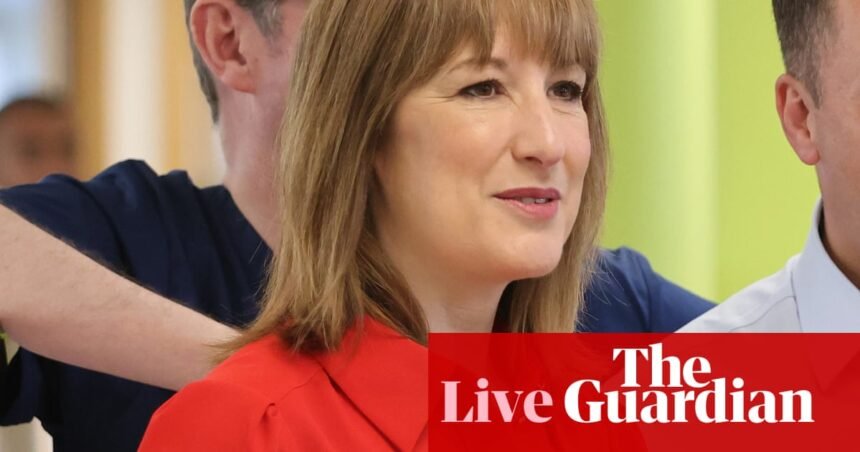Reeves says it was her job to be at PMQs supporting government, but ‘clearly I was upset’
Rachel Reeves has said “clearly I was upset” when asked about being tearful during PMQs yesterday, PA Media reports. But it was her job to be at PMQs “supporting the government and that’s what I tried to do”, she said.
Reeves also appeared to reject suggestions that her tears were related to a conversation with Commons Speaker Sir Lindsay Hoyle or another member of government.
Asked whether this was the case, the chancellor told broadcasters:
No, it was a personal issue, and I’m not going into the details of that. It wouldn’t be right or fair. People saw I was upset, but that was yesterday. Today’s a new day and I’m just cracking on with the job.
My job as chancellor is to return the stability to the economy, bring investment into Britain, but most importantly to improve the lives of ordinary working people, which is why I’m so pleased that in this first year interest rates have come down four times, saving money for people with mortgages, I’ve been the chancellor who’s increased the national living wage… so I’m proud of what we’ve done this last year.
But is there more to do as a government? Absolutely there is, and I’m going to get on with that job.
Key events
Jeremy Paxman used to be the TV interviewer best known for his mastery of the ‘Why are you so useless?’ question. These days Beth Rigby from Sky News is probably the lead expert at this style of questioning. Here is the clip of her question to Starmer.
Reeves says it was her job to be at PMQs supporting government, but ‘clearly I was upset’
Rachel Reeves has said “clearly I was upset” when asked about being tearful during PMQs yesterday, PA Media reports. But it was her job to be at PMQs “supporting the government and that’s what I tried to do”, she said.
Reeves also appeared to reject suggestions that her tears were related to a conversation with Commons Speaker Sir Lindsay Hoyle or another member of government.
Asked whether this was the case, the chancellor told broadcasters:
No, it was a personal issue, and I’m not going into the details of that. It wouldn’t be right or fair. People saw I was upset, but that was yesterday. Today’s a new day and I’m just cracking on with the job.
My job as chancellor is to return the stability to the economy, bring investment into Britain, but most importantly to improve the lives of ordinary working people, which is why I’m so pleased that in this first year interest rates have come down four times, saving money for people with mortgages, I’ve been the chancellor who’s increased the national living wage… so I’m proud of what we’ve done this last year.
But is there more to do as a government? Absolutely there is, and I’m going to get on with that job.
During his Q&A Keir Starmer sidestepped a question about whether President Trump should address parliament when he makes his state visit to the UK. Starmer said details of the visit would be announced nearer the time. (See 11.30am.)
Some MPs and peers have said they would oppose Trump getting an invitation to address them.
Streeting publishes 10-year health plan for England
In the Commons Wes Streeting, the health secretary, is making his statement about the health plan for England now.
The Department of Health and Social Care has now published the plan on its website.
Q: [From the Guardian’s Peter Walker] Are you concerned about being accused of nanny state politics? And the Guardian has calculated that health inequality is costing the NHS £50bn. Is tackling poverty part of your NHS plan?
Starmer said he wanted to take the nanny state charge head-on.
He said he was schocked to learn that tooth decay was the main cause of hospitalisation for children in Liverpool. The government is promoting teeth brushing in schools. He said:
I’m not interested in arguing about nanny state. If the price of not doing it is a child losing his or her teeth before they’re 10 years old, I’ll take those measures any day of the week, and I’ll defend them any day of the week.
And he said he “absolutely” accepted that there was a link between poverty and ill health.
Q: Have you given up hopes of getting rid of the two-child benefit cap?
Starmer says the government is still very committed to cutting child poverty.
Starmer says the death of Diogo Jota is “devastating news”. He says the thoughts of everyone will be with his family and friends. But millions of fans will be shocked too, he says.
Starmer sidesteps question about whether Trump should address parliament on his state visit
Q: What advice would you give yourself if could go back to this time last year? And, given that President Macron will be addressing parliament when he comes to the UK next week, would you like to see President Trump address parliament.
On the Macron visit, Starmer says the UK-France relationship is now in a “very strong place). He says the relationship with the US is very strong too. He does not address the point about Trump addressing parliament, but he says the details of Trump’s visit will be announced nearer the time.
On lessons, he says what is important is to remember who is in your “mind’s eye” when taking decisons.
Q: [From Chris Hope from GB News] Have you given up on welfare reform now? And will you have a word with Lindsay Hoyle, the Speaker, about what he said to Reeves yesterday?
[Hoyle is said to have angrily reprimanded Reeves yesterday, about the way she handled Treasury questions on Tuesday, in a row that is alleged to have contributed to her being upset at PMQs yesterday.]
Starmer says he won’t comment on the second question.
On the first, he says that the government remains committed to welfare reform. And he says Stephen Timms is a good person to oversee that because he is so widely respected.
Starmer rejects suggestion pressure becoming too much for Reeves
Q: Do you worry that the pressure is becoming too much for the chancellor?
No, says Starmer. He says he and Reeves “work in lockstep”.
Starmer again declines to rule out tax rises in autumn budget
Q: [From Gary Gibbon from Channel 4 News] The chancellor has said you will not raise taxes again on the scale that happened last year. Can you repeat that today. Experts say you can’t.
Starmer says he will not announce budget decisions now.
But he says the decisions they took last year were “heavy lifting” to repair the finances. As a result of those measures, they turned the economy around, he says.
Starmer: NHS plan only possible because of decisions by Reeves
Q: Why is the chancellor here? Is she here to calm the markets?
Starmer says Reeves is here because she is the chancellor, and because they can only deliver the NHS plan because of her decisions.
Beth Rigby from Sky News asks about Starmer’s authority. And he asks why Starmer did not offer any comfort to Rachel Reeves in the chamber.
On the second point, Starmer says he was focusing on what was happening in his exchanges. “In PMQs it is bang, bang, bang,” he says
On her broader point, Starmer rattles through some of the government’s achievements: waiting lists being cut, extra appointment, work starting on delivering more houses, breakfast clubs, free school meals, the biggest upgrade in employment rights in a generation, investment coming to the UK, an uplift to defence spending, the fiscal rules being kept, and trade deals being delivered. He could go on.
Rigby claims Starmer ignored her question, which covered the welfare U-turn.
Starmer says he has already admitted that “we did not get the process there right”.
Hugh Pym from the BBC, who asked the first question, also asked Rachel Reeves to comment on what happened in the Commons yesterday.
Starmer says that was a personal matter. He does not invite Reeves to answer.
Starmer is now taking questions.
He says some of these changes are happening now. Others will take a bit longer.
But he wants to ensure that, in 10, 20, or 30 years, people view this as the government that transformed the NHS.
Starmer says NHS app to be transformed as part of 10-year plan, so it becomes ‘doctor in your pocket’
Starmer confirms that there are three principles behind the 10-year plan.
First, it will make the NHS focus much more on prevention, so it prevents people getting ill in the first place.
That means a stronger focus on vaccination, on screening, early diagnosis, things like innovative weight loss services, which can be available in pharmacies, working with major food businesses to make their products healthier, better mental health support, particularly for our young people, and starting with children aged 16, we will raise the first entirely smoke free generation.
Second, the NHS will shift from being a hospital-dominated service to being a “community, neighbourhood health service”.
So just imagine it – nurses, doctors, pharmacists, dentists, carers, health visitors, all under one roof, also alongside them services like debt advice, employment support, smoking cessation, preventative services, which we know are so crucial for a healthy life. That is an exciting process.
The idea that the future of healthcare is no longer defined by top-down citadels of the central state, but it instead in your home, in your community, in your hands – that is an inspiring vision of change.
And, third, the NHS will become more digital, he says.
He invites people to get their phones out – not something he normally wants them to do in a speech, he says. And then he invites them to consider all the apps they have on their phone.
He goes on:
Entire industries have reorganised around apps. Retail knows the power of it, transport, finance, you name it, shopping. Why can’t we do that with health?
Why can’t we have that app on your phone? Why not the NHS app on your phone, making use of the same dynamic force to cut waiting lists at your hospital, to make it easier to book an appointment with your GP to give you more control over our health.
There is no good reason why we can’t, and so I’m announcing today as part of this plan that we can and we will transform the NHS app so it becomes an indispensable part of life for everyone.
It will become, as technology develops, like having a doctor in your pocket, providing you with 24 hours advice, seven days a week, an NHS that really is always there when you need it.
Keir Starmer is speaking now.
He says he understands the importance of the NHS because his mother and sister worked for it, and his wife still does.
He says he is under no illusions about how much work there is to do to improve the NHS.
But the government is making progress, he says.
Paying tribute to Rachel Reeves, he says that because of the extra investment going into the NHS the government has been able to hire 6,000 more mental health workers, and 1,700 GPs. And 170 community diagnostic centres have opened, and 4m extra appointments have been delivered.
Reeves speaks at launch of 10-year NHS plan, defending fiscal rules, and without reference to yesterday’s PMQs
Rachel Reeves, the chancellor, is smiling a lot as she says the plan will get the NHS “back on its feet”.
And she says she has only been able to invest in public services by sticking to her fiscal rules.
She does not refer to what happened in the Commons yesterday at PMQs.







